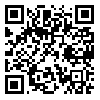Background & Aim: During late decade, addiction was one of the most important social and health issues in Iran. Due to this, it has a significant importance to focus on examine effects of psychosocial treatments on addicted social and health issues. The objective of current study is assessment the effectiveness of integrative intervention of group cognitive-behavioral and family positive thinking on quality of life in addicted peoples.
Material & Methods: The study was conducted as clinical trial. According to the convenient sampling, 30 addicted persons allocated randomly into 2 groups of experiment (n=15) and control (n=15). The intervention was 12 sessions’ 90-minutes for addicted ones with cognitive-behavioral therapy and 8 sessions’ 90-minutes for the first grade family of samples with positive thinking. Collecting data instrument was quality of life SF-36 questionnaire that was filled before and after of intervention in two groups. Findings were analyzed with SPSS, version 16 and by descriptive and inferential statistics.
Results: ANOVA findings showed that quality of life scores had significant difference in overall scores (P=0.001), and in subscales (p<0.05) in two groups.
Conclusion: Results showed that integrative intervention of group cognitive-behavioral and family positive thinking has positive effects on quality of life in addicted peoples.
Received: 2016/05/31 | Accepted: 2016/05/31 | Published: 2016/05/31
| Rights and permissions | |
 |
This work is licensed under a Creative Commons Attribution-NonCommercial 4.0 International License. |
